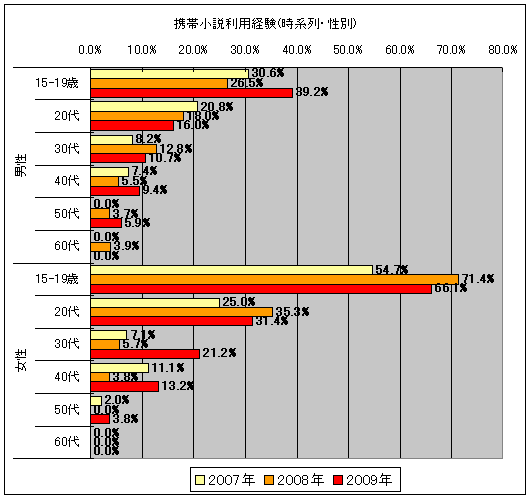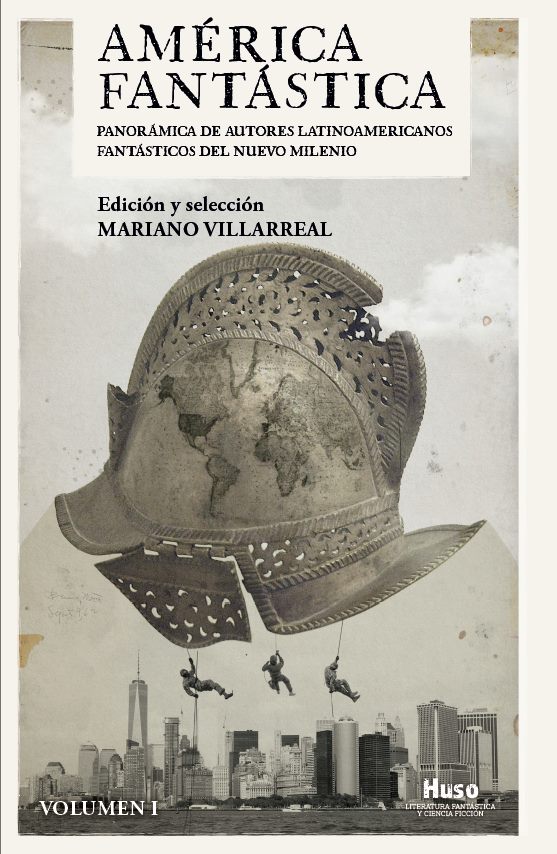
You’ve heard all about the death of the novel. Too many times. Your eyes glaze over at the very words. They itch like you’ve been staring at a screen too long. But guess what?
The novel is dead. And I know what killed it.
The keitai novel.
Keitai means portable in Japanese, but in this case it’s short for keitai denwa, cell phone. A keitai novel is one written on a cell phone–at least, that’s the idea; I have never yet caught a keitai novelist at it–to be read on a cell phone, and that part makes sense, because isn’t that where we do most of our reading nowadays? The Kindle’s just too big and heavy to lug around. An iPhone is so much more convenient. Or an Xperia, or an ELUGA, or an Aquos, or a HumpBACK, or a Pygmy Minke Whale, or whatever happens to reside in your pocket(1).

The chart on the right illustrates keitai novel readership in Japan as of 2009. The numbers on the Y axis are the ages of survey respondents. The percentages are those who have ever read a keitai novel. The top half (男性) is male respondents, the bottom half (女性) is female.
Look at the percentages in the teenage and twenties age brackets. Are you surprised? Nor am I. After all, no one has the attention span to read War and Peace anymore! No one outside of academia has the erudition to parse their way through sentences of Jamesian complexity and grandeur. And the same applies in Japan, squared, because the Japanese language has changed faster than the English language. Even early 20th century texts are tough for native speakers to struggle through. The Tale of Genji has to be taught in school as if it were written in a foreign language. A few years back a Buddhist nun, Setouchi Jakucho, made a killing “translating” Genji into modern Japanese.
Enter the keitai novel. These are long-form stories by amateurs indie writers who give their work away for free on the internet. Just download and start reading! It’s piracy without the guilt.
Let’s take a look at the currently top-ranked work on Maho no Island [Magic Island], which calls itself Japan’s biggest keitai community.
You Make Me Sick, Woman. Genre: romance.
I’m never gonna fall in love with a woman.
Never. No way.
That’s what I decided.
… And that’s when it started.
Next page, we’re plunged into a sex scene. Credit where it’s due, it’s not erotic nor intended to be. Still, I think I know how the next 303 pages of this are going to play out, so let’s try some science fiction. The top-ranked SF novel on honyasan.net, the prosaically named “bookstore.net,” is titled 20XX. We get an adult content warning, and then it’s off to the races:
… It was something that happened when I was in high school.
I didn’t belong to any clubs. A friend asked me to join their occult hobby group, and I just went along with him because I couldn’t think of any excuse. Did the paperwork, became an official member.
“Takei? That’s not a name I know.”
But everyone knew the occult club leader, Sendo. Word was he was crazy about the occult, knew all kinds of frightening stories.
I kind of want to go on reading this! Shame I don’t have a smartphone.
We could argue about whether keitai novels as a genre are any good, but sitting out here on the edge of forever, I have no stomach for subjective judgments of artistic quality. Art isn’t in it, anyway. What I want to zero in on here is the way that keitai novels make us read.
The screen is small. There’s a lot of white space. Lines are short. Paragraphs are rarely longer than a couple of sentences. You read this kind of thing the way you read a website like Amazing Stories: bouncing down the page like you’re in freefall, caroming gently off the walls of your spaceship, grabbing onto whatever handholds come in reach. You’re safe and cozy, cocooned against the hard vacuum outside, but there’s no stopping. Your thumb automatically clicks over to the next page, because … inertia.
This is what reading on the internet is all about. Inertia. An endless fall into the screen.
The keitai novel brings this sensibility to long-form fiction.
As far as I know, keitai novels don’t yet exist in the West as a category. But in this, as in so much, Japanese is just a decade or so ahead of the curve. Works like Woman, You Make Me Sick and 20XX are coming soon to a small (very small) screen near you.
Naze Keitai Shousetsu wa Ureru no ka [Why Do Keitai Novels Sell?], by literary critic Toru Honda, treads ground mostly familiar to anyone with half an eye on the indie publishing scene: writers can connect directly with readers, bye-bye gatekeepers, farewell to middlemen, etc., etc.–but then Honda ingenuously slips in the incendiary, eyewateringly obvious proposition that keitai novels are not novels. Nor are they books. They’re something else. He suggests they’re “fan items.”
A “fan item” is something that an avid gamer might buy in order to give his character more power. In the real world, it might be something you buy to express your fannishness, such as a “dezaskin” for your smartphone.
Ladies and gentlemen, we’re not writing novels anymore We’re writing dezaskins.
I could easily produce a long screed against this, calling for a return to the good old days when readers “engaged deeply” with “texts,” books had smells, we measured our progress by pages rather than percentages, and the African lion was not an endangered species. But at the risk of disappointing my fellow Young Fogeys, I’m not gonna.
‘Cos I’m part of it. I may not have a smartphone, but the internet and the Kindle have changed my reading habits. I read more, faster, and I read longer novels than I used to. When I relax with a good book .mobi file, I want to experience that weightless slip-sliding fall into the screen. It follows that my own novels stories are a lot more keitai-ish than they used to be. You write what you want to read.
I never liked calling myself a “novelist” anyway(2). Novelists write prose “supposed to give us profound insight into character and help us work through our own existential quandaries by proxy.” I write stories. I’ve been calling them novels, faute de mieux, but now I think it’s about time to update my terminology. “Epics” sounds better and is truer. I am an epicist!(3)
The novel is dead. Meet me for a party in the graveyard.
***
1. I made those last two up.
2. Saying “I am a novelist” makes me feel as if I were 50 pounds heavier, wearing another 20 pounds in jewellery (probably purchased through Etsy) and a velvet corset, with a degree from Oberlin or Swarthmore instead of this place, pristine woodland beyond my window instead of a construction site and a parking lot, and a couple of pedigree dogs playing on the floor.
3. Whereas this makes me feel like a grubby-nailed craftswoman with stars in my eyes, Baby on my hip, and a Leatherman on my belt. And a 10-kilo sack of rice in the closet, cunningly concealing the shotgun.
.










